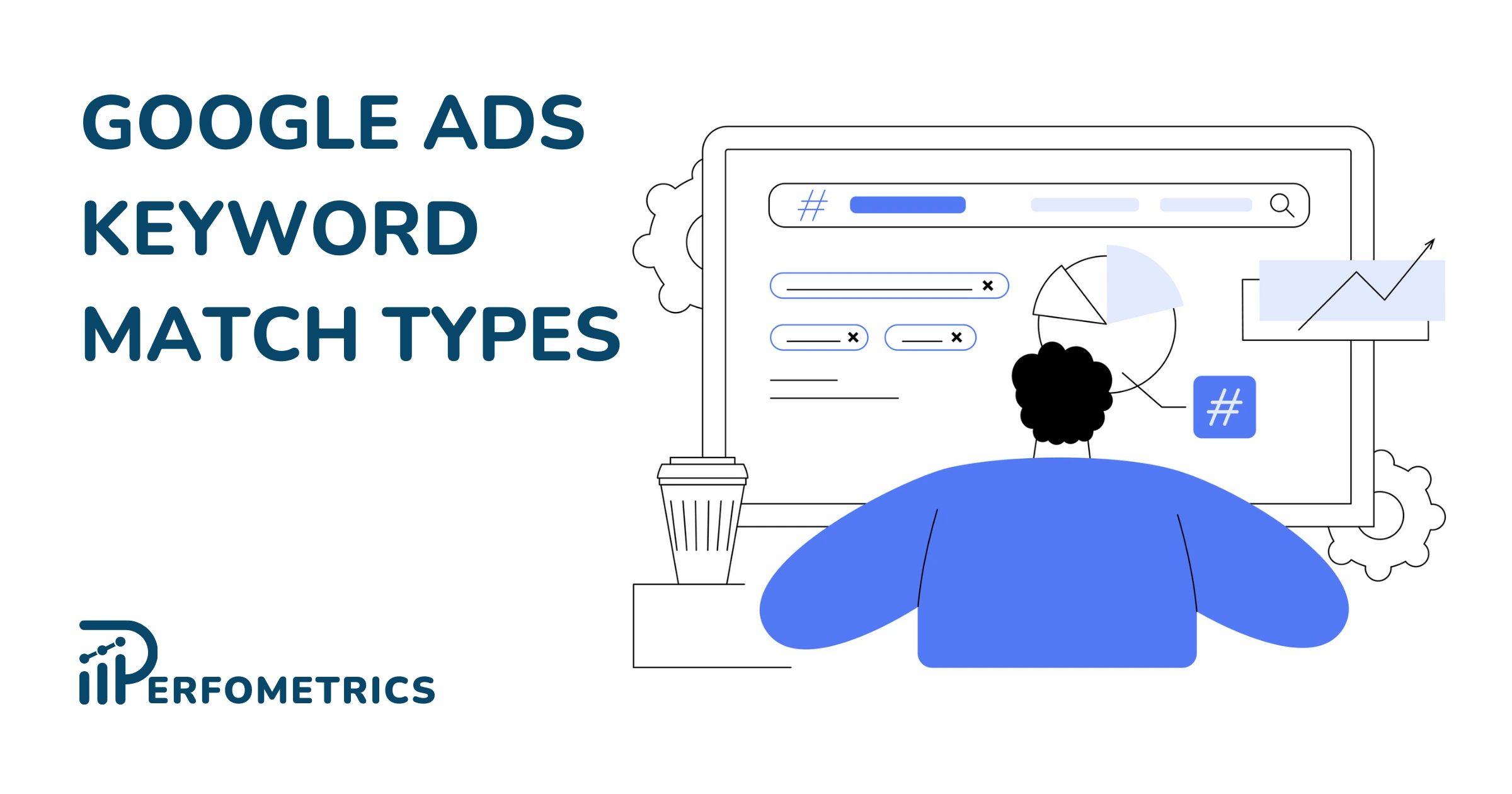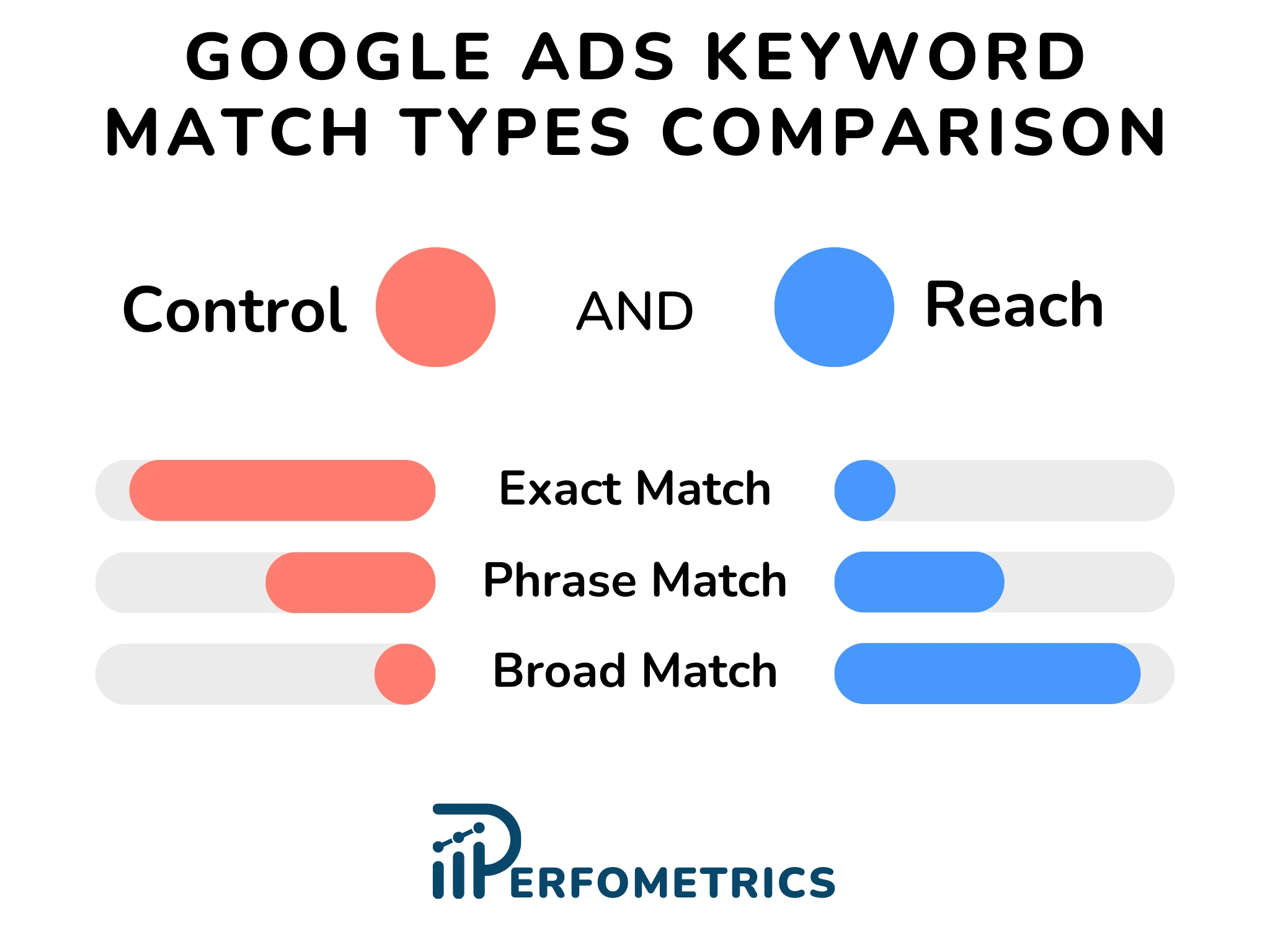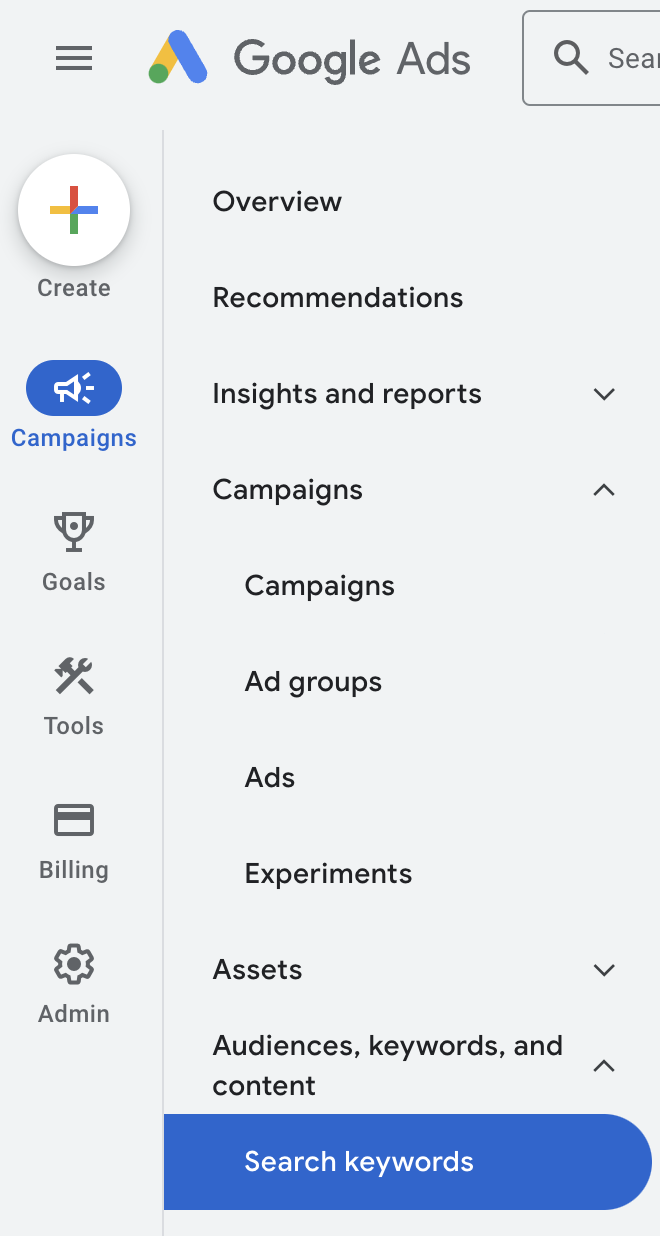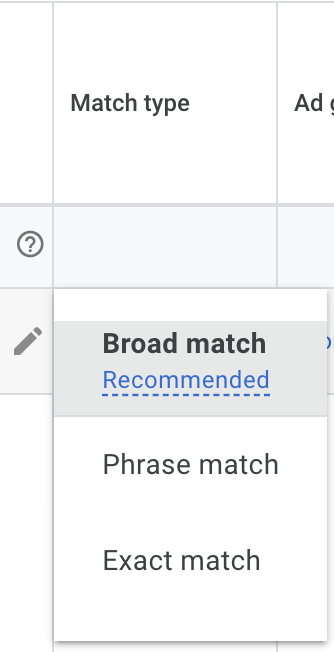Google Ads Keyword Match Types

Google Ads keyword match types not only dictate the relationship between a user’s search query and your selected keywords but also determine the level of correlation required for your ad to participate in the auction.
They wield the power to influence campaign performance by ensuring that your ads are displayed for the most pertinent searches, with varying levels of specificity.
Unlocking the Potential of Google Ads Keyword Match Types
In Google Ads, keyword match types are the navigational compass guiding your ads to the right audience. They determine how closely a user’s search query must match your keywords for your ad to be considered in the auction, thus controlling when your ads are triggered. Imagine the power of deciding just how precise or broad you want your ads’ reach to be!
But why does this matter? Keyword match types hold the reins to your ad triggering, giving you control over ad displays and helping you manage your budget and traffic qualification in your search campaigns. They are your allies in ensuring your ads are shown for relevant searches, whether they are broad or precise, and help you avoid the pitfalls of irrelevant traffic.
What Are The 3 Keyword Match Types in Google Ads?
The three Google Ads keyword match types are Exact, Phrase, and Broad.
- Exact match offers the most control over who sees your ad.
- Phrase match balances reach and precision
- Broad match expands your reach with more searches and less control.
Google Ads negative keyword match type is also available for more control over who views your ad.

Broad Match Keywords
Broad match keywords are all about expanding your reach. They cast a wide net, enabling your ads to display whenever a user’s search query contains any word in your key phrase, in any order, as well as any word related to your keyword.
While broad match keywords can open the floodgates to a wide array of searches, they may also attract irrelevant traffic.
A well-researched and precise negative keyword list can act as a shield, preventing your ads from showing on irrelevant traffic and enhancing the effectiveness of your broad match keywords.
It’s all about striking a balance between expanding your reach and maintaining relevancy.
Phrase Match Keywords
Phrase match keywords provide a balance between reach and precision, targeting search terms that convey the same meaning as your specified keyword, even if the words aren’t in the exact order.
The beauty of phrase match keywords lies in their ability to maintain relevance while capturing a good chunk of search volume. That’s right, they ensure your ads are only displayed for searches that include your specified product or service.
They not only provide a wider reach than exact match but also a narrower reach than broad match, making them the perfect middle ground.
And when it comes to implementing phrase match keyword, all you need to do is enclose your keyword in quotation marks.
Exact Match Keywords
Exact match keywords offer the highest level of precision by targeting only exact search terms or their close variants. They are the snipers of keyword match types, targeting with precision and leaving no room for deviation.
So, if you’re looking for a targeted approach and don’t mind the potential lower search volume, exact match keywords are your go-to for exact keywords.
To combat lower search volumes Google’s AI comes to your rescue. It has extended the scope of exact match to include, close variants, synonyms, plurals and other variations on the keyword
This ensures that the meaning remains largely preserved and you can reach a wider audience without losing the precision of exact match.
How to Change the Keywords Match Type in Google Ads?
To change the match type of your Google Ads keywords follow these steps:
- Sign in to your Google Ads account
- Navigate to the Search campaign
- On the left side bar click on “Audiences, keywords and content” and select “Search keywords”
- Select the keyword and use the exsiting “Match type” column to modify the match type


Note: be careful when changing the match type directly of an existing keyword, your past and upcoming data will be hard to separate. We suggest adding instead the same keyword in the desired match type.
Refining Campaigns with Negative Keyword Match Types
Now that we’ve explored the three main keyword match types, let’s shift our focus to a crucial tool for refining your campaigns – Google Ads negative keyword match types. These match types are your secret weapon in excluding irrelevant or low-converting search queries from triggering your ads. Think of them as a filtration system, ensuring only the most relevant traffic gets through.
Three types of negative keywords are available:
- Negative broad match: prevents your ads from displaying if all the keyword terms are present in any order.
- Negative phrase match: prevents your ads from displaying for search terms that include the precise phrase in the exact order.
- Negative exact match: offers the highest level of exclusion, prohibiting your ads from appearing for queries that precisely match the specified keywords.
Negative Broad Match Keywords
Negative broad match keywords offer more constraint compared to phrase or exact match negative keywords. By using negative broad match keywords, you can effectively filter out a wider range of irrelevant search queries, enhancing the overall performance of your campaign and ensuring your ads are only shown for the most relevant searches.
For example, if you’ve designated ‘running shoes’ as a negative broad match keyword, your ads won’t show for searches like ‘blue running shoes’ or ‘shoes running’. This way, you can keep your ads focused on the most relevant traffic.
Negative Phrase Match Keywords
Negative phrase match keywords offer a refined approach to ad exclusion, allowing you to maintain more control over what queries trigger the exclusion.
Negative phrase match keywords prevent your ads from displaying for search terms that include the precise phrase in the specified order, irrespective of any additional words before or after the phrase.
So, if ‘running shoes’ is your negative phrase match, your ads won’t show for ‘discount running shoes’, but might still appear for ‘running sneakers’.
Negative Exact Match Keywords
Negative exact match keywords offer a superior level of exclusion, prohibiting your ads from appearing for search queries that precisely match the specified keywords, without any additional words.
Negative exact match keywords have a significant impact on the relevance of your ads by preventing them from appearing for specific irrelevant terms.
So, if you’ve specified [running shoes] as a negative exact match keyword, your ads won’t show for that exact search term. It’s like having a laser-guided exclusion system for your ads!
When to Use Each Keyword Match Type?
With an understanding of the different keyword match types and their roles, it’s time to craft your strategy.
Choosing between broad and specific targeting is a crucial decision in your campaign strategy. If you aim to reach as many people as possible, broad match keywords are your best bet. But if you’re after a more targeted approach, you might want to opt for phrase or exact match keywords.
The choice largely depends on your campaign goals, budget, and desired audience reach. It’s like choosing between casting a wide net or going fishing with a spear – each has its own merits and drawbacks.
Your budget also plays a crucial role in this decision. Broad targeting can potentially increase your reach but will also require a bigger budget to spend, while specific targeting enables more precise audience targeting and can be a lot more cost-effective.
Within ad groups, you can adjust match types to improve efficiency and avoid competing against your ads. By implementing a framework that encourages the strategic use of combined match types, you can mitigate inefficiencies and streamline your campaign management. It’s like having a well-oiled machine, where every part works in harmony to achieve the desired result.
But beware of the common pitfalls. Avoid:
- relying solely on broad match keywords
- neglecting to exclude exact match keywords when segmenting
- excessively using a single keyword match type without diversification
By steering clear of these mistakes, you can ensure your ad groups work in harmony, maximizing your campaign performance.
💡 For more, read: common Google Ads mistakes.
Smart Bidding Strategies and Match Types: A Synergistic Approach
We’ve talked about keyword match types, but what about smart bidding? Smart bidding strategies in Google Ads are a powerful tool that uses artificial intelligence and machine learning to optimize your campaigns for conversions or specific objectives.
It considers variables such as:
- search query
- device
- location
- time of day
During auctions, smart bidding can determine the most effective bid. When used in conjunction with keyword match types, smart bidding can supercharge your campaign performance.
It uses advanced algorithms to adjust your bids based on conversion data, negative keywords, and search queries, ensuring your ads are targeted towards the most relevant audience. It’s like having a personal coach for your Google Ads campaigns, helping you optimize performance and reach your goals.
Using smart bidding with broad match keywords can unlock their full potential. By leveraging machine learning algorithms, smart bidding can:
- Adjust your bids for broad match keywords based on conversion data, negative keywords, and search queries
- Cast a wide net while ensuring your ads are shown to the most relevant customers
- Maximize the performance of your broad match keywords in accordance to the campaign objectives
Smart bidding can enhance the performance of your exact and phrase match keywords. By leveraging Google’s AI and machine learning, smart bidding can strategically optimize your ad campaigns according to the match type. This involves bid adjustments aimed at maximizing performance and achieving your desired target CPA or ROAS.
Whether you’re using phrase match keywords for a balance between reach and precision or exact match keywords for laser-like targeting, smart bidding can optimize their performance.
By adjusting bids for individual search queries based on historical data and real-time variables like user device and location, smart bidding can maximize your return on ad spend and achieve your campaign objectives effectively.
Our Final Thoughts
In conclusion, Google Ads keyword match types, be it broad, phrase, exact, or negative, along with smart bidding strategies, play a crucial role in the success of your ad campaigns. Each match type serves a unique purpose, and their strategic use can optimize your campaign performance, reach, and budget efficiency.
- There are three keyword match types in Google Ads: Exact, Phrase, and Broad.
- Exact match offers precision targeting, Phrase match balances reach and precision, while Broad match expands reach.
- Use negative keyword match types (Broad, Phrase, Exact) to refine campaigns.
- Match types and Smart Bidding strategies work together for optimized campaign performance.
- Choose match types based on campaign goals, budget, and desired audience reach.




